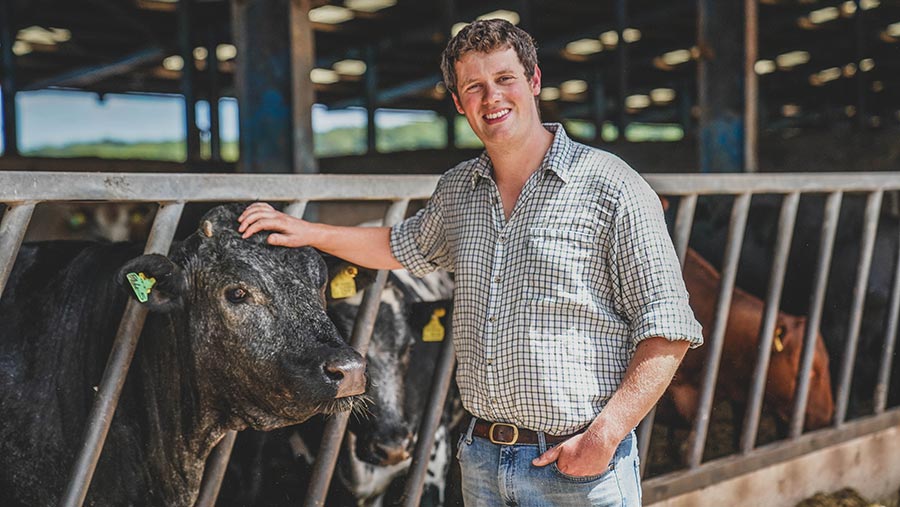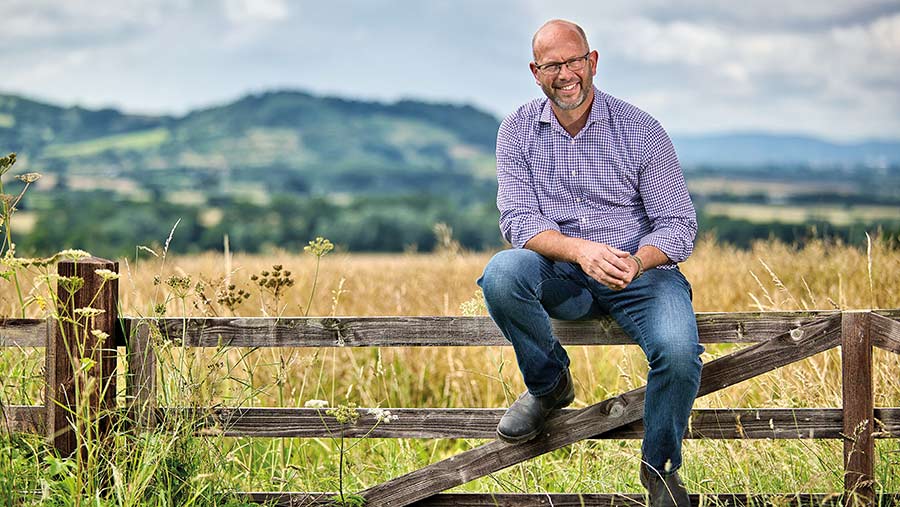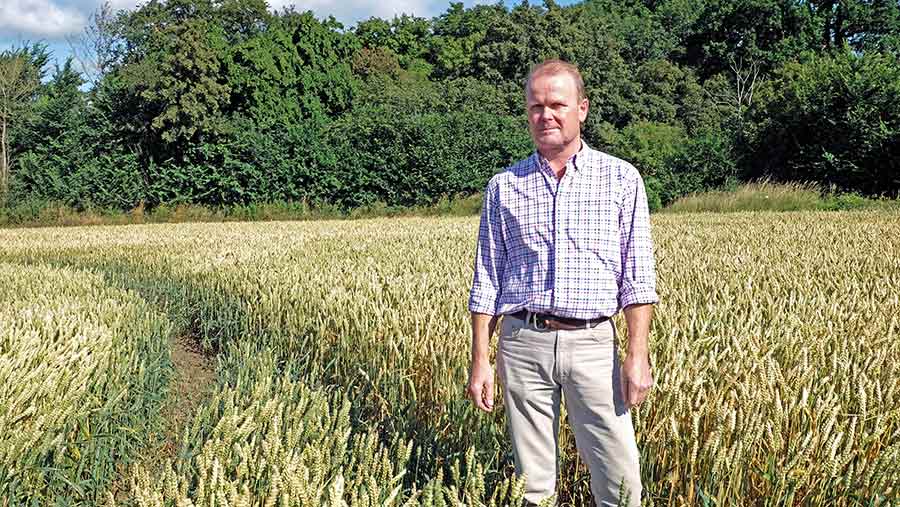Farmers Weekly Awards: Farm Manager finalists 2021

This year’s finalists share many challenges in steering the businesses they manage.
While their farms are very different, they also share a dedication to seeking improvements at every opportunity.
The finalists:
- Tom Chanter, FWS Carter & Sons, Woodbury Salterton, Devon
- Jake Freestone, Overbury Enterprises, Overbury, Gloucestershire
- Edward Vipond, Troston Farms, Stanton, Suffolk
See also: Farmers Weekly Awards: Congratulations to our 2021 shortlist
The judges:
The judges visited each of the finalist for a three-hour interview and tour of their farm.
The Farm Manager of the Year judges are:
- Peter Eccles, last year’s winner
- Suzie Horne, Farmers Weekly business editor
- Andrew Robinson, farm manager at Heathcote Farms
Tom Chanter, FWS Carter & Sons, Woodbury Salterton, Devon

Tom Chanter © Emily Fleur
Tom Chanter is most proud of having turned a loss-making beef unit into a profitable, efficient, safe and high welfare enterprise.
In less than four years managing the Greendale group’s farming business, he has improved growth rate, labour cost, mortality rates, grading outcomes, numbers sold and margin a head.
The business also supplies maize to a hungry anaerobic digestion (AD) plant and is part of a wider group, including industrial units, a marina, fishing boats and a flourishing farm shop.
Tom joined the business in late 2017 to eye-watering wastage and dire growth rates. With a background in nutrition, this was his immediate focus, and he set about improving palatability and moved the cattle to feeding three times day instead of just once.
Feed wastage has been cut from an estimated 15-20% to about 5%, with a target of 3%.
Attention to detail
Cattle are on the farm for 90-100 days, with about 80% bought on commission though livestock markets. Every animal is now treated as an individual, achieving a daily average growth rate of 1.43kg.
Everything is closely planned, costed and analysed. By the first six months of 2019, Tom had 87% of cattle hitting the grade and weight for his main customer, Woodheads, supplying Morrisons. Now it’s 98%.
Wholesale butcher Weddel Swift is a more recent customer and the farm shop also now buys 500 carcasses a year – double the quantity of three years ago.
The unit is also a pilot farm for Morrisons’ net-zero beef project and a favoured supplier because it can guarantee 2,500 head a year, which nets a decent guaranteed base price and bonuses for meeting spec.
Risk management
Always aware of vulnerability to input and cattle price fluctuations, Tom has developed a six- to 12-month book of forward feed ingredient purchases to enable closer budgeting and to reduce price risk.
He also cut the farm’s machinery fleet – cereal cultivations, muckspreading and haulage are done in-house, with drilling and harvesting carried out by a contractor. This gives a better spread of labour and machinery costs, as well as improved timeliness.
Contractors handle maize for both the AD plant and cattle feed, with a fixed margin a tonne having been negotiated for maize supplied to the biodigester.
Further risks to the business include reliance on rented land, while the main arable challenges are blackgrass and compaction.
Innovation
Tom designed a daily safety-checks app for the farm machinery fleet, which has now been adopted for 200 vehicles across the whole group.
Working with the directors and stockman, a new cattle handling and ID system has been installed, with much trial, error, sweat and tears to get the different parts of the system to co-operate with each other. Every animal is now tagged for electronic identification, enabling informed selection of cattle.
Tom manages a team of four, with staff given responsibility, annual reviews and target-led incentives – for example, relating to machinery repairs and health and safety.
Social outings help knit the team together and include go-karting events, a group Christmas party and one for the farm team.
Help is taken on at peak times, including sharing labour with contractors, with whom the farm team work closely.
Tom sees food education as pivotal to the future of farming and hosts school visits twice a year, as well as other farmer and non-farmer group visits. He is also a board member of the National Beef Association.
What the judges say
Tom has a superb understanding of all costings, enabling a return to profit in the past few years. His background in nutrition has proved extremely valuable in achieving this.”
Summary
The judges liked
- Close analysis of production costs
- Forward buying feed ingredients to manage risk
- Improved nutrition and cattle performance
- Provides customers with consistent quality they want
- Working with large retailer and wider industry to achieve zero-carbon beef
- Successful creation of mobile phone app for safety checks on farm kit
Farm facts
- 344ha owned, 384ha rented
- Arable and cattle finishing
- Maize for AD and cattle, also oats, hybrid rye, barley, forage rye
- Recent investment in cattle handling
- Involvement in two ELM trials and Morrison’s net-zero beef project
- Countryside Stewardship scheme
The numbers
- 4,000 Head cattle finished – this year’s target
- 1.43kg Daily liveweight gain
- 5% Feed waste, down from 15-20%, target to cut to 3%
- 90-100 Number of days beef cattle spend on farm
- 200 Number of group vehicles now using Tom’s daily safety-check app
Jake Freestone, Overbury Enterprises, Overbury, Gloucestershire

Jake Freestone © Richard Stanton
A 2013 Nuffield Scholarship cemented Jake’s ambition for a new farming system at Overbury.
Travelling the world to look at crop production, the attention to detail he saw in improving soils through regenerative practices spurred him to a similar approach in tackling the main challenges to the business.
He lists these as climate change, volatile markets, an ageing workforce, rising costs and reducing support.
While the financial benefits are important, he is most proud of the increased biodiversity achieved across the entire estate, seeing nature thrive alongside the production of high-quality profitable crops.
Jake has full responsibility for budgeting, purchasing, marketing, compliance, personnel and investment, also playing a wider role in the Overbury Enterprises business.
The farm is now no-till, grows cover crops extensively and has a longer, more diverse rotation, including sheep.
The move has reduced production costs, but maintained yields on soils ranging from Evesham clay though sand and gravel to Cotswold brash, and lowered exposure to climate risk.
The switch to no-till has cut carbon emissions by half and the farm now sequesters more carbon than it emits.
Production cost savings
A cross-slot drill helped cut establishment costs from £169/ha to £46/ha.
Using less synthetic fertiliser and increased applications such as biosolids and poultry litter, the annual net saving on the fertiliser account is £42,464.
No insecticides are used in the arable rotation, raising insect and bird populations, while extensive tissue testing has largely eliminated the use of seed dressings.
Soil organic matter in the three main soils has been raised by 1.7 percentage points over seven years and is growing at 0.2 percentage points a year.
Expansion of the acreage and reduced fixed costs has come through a contract-farming agreement with a neighbouring landowner.
Cropping and marketing is aimed at adding value through milling, malting and seed contracts.
The main ewe flock is 75% North Country Mules, the remainder Romney cross Aberfield, with lambs sold deadweight through May Hill Lamb group.
From the 2020 crop, 97% hit the spec for condition and fat class. The small Dorset flock is lambed at Christmas and sold to a customer just 90m from the farm boundary and through Overbury Enterprises’ own box scheme.
Staff management
The experienced and settled full-time workforce of five is augmented by a Hartpury student and a part-retired general farm worker. All are involved in decision-making.
Regular team meetings include analysis of the farm’s strengths, weaknesses, opportunities and threats, with individual meetings covering health and safety, training needs and any concerns. There is a thorough induction for new staff.
Environment
Biodiversity counts show continued improvements in flora and fauna – monitoring of farmland birds, wildflowers and grass species began in 2004 and moth surveys in 2016.
Stewardship income has been increased through a Higher Tier agreement starting in Jan 2021 and Jake has also instigated many non-funded environmental measures.
He has a high profile on social media and is a great ambassador for farming and the environment, at both a farm sector level and more widely in public-facing roles including hosting Open Farm Sunday, schools and many other groups. He holds numerous positions on farming and environmental bodies and initiatives.
The next five years will see a continued focus on cost control and adding value, with arable, sheep and stewardship at its core. A mobile chicken unit and bed-and-breakfast pigs are being considered, helping optimise the arable labour team over winter and producing more farmyard manure on farm.
What the judges say
Jake’s management of soils and the environment is second to none. He has led his team well through the move from a min-till-based system to a direct-drill approach.
Summary
The judges liked
- Clear vision to improve soil and animal health and build a robust business with multiple revenue streams
- Impressive crop health and yields on regenerative system
- Integration of livestock and arable, benefitting both
- Extensive awareness raising to wider public and schools of farming and benefits of the Overbury approach
Farm facts
- 1,600ha of in-hand land, of which 950ha arable, plus 250ha contract farmed for neighbour
- Milling wheat, OSR, peas, beans, linseed, quinoa and malting barley
- 1,050 outdoor-lambing ewe flock, small pedigree Dorset flock
- Higher Tier stewardship started January 2021
- Leaf demonstration farm since 2012 and an Agri-EPI satellite farm for hosting agri-tech research
The numbers
- £795/ha Harvest 2020 average arable gross margin
- £46/ha Establishment costs, compared with £169/ha under previous system
- 3,935t Farm’s annual carbon emissions
- 4,323t Farm’s annual carbon sequestration
- 10,000t New grain store, allows marketing flexibility and third-party storage income
- 690mm Five-year average rainfall – five of past six years have been below this level
Edward Vipond, Troston Farms, Stanton, Suffolk

Edward Vipond © Jason Bye
Edward runs a profitable and expanding farm business. On joining six years ago, an extra 150ha was taken on, followed by 230ha in 2018 and 215ha this year.
He manages rotations on soil types from heavy clay to Breckland sand, with the main challenges on his arrival being a significant blackgrass issue, poor soil structure, with machinery and cropping ill-suited to the soil types.
Edward’s wholesale changes to rotations have seen oilseed rape, sugar beet and forage rye removed from the light land, with sunflowers and milling rye replacing these to reduce risk.
He has also moved away from contract hire to hire purchase with extended warranty to secure the running costs of the main kit.
Digestate and pig slurry are used to maintain organic matter and there is a straw-for-muck agreement with a local pig producer.
Edward’s role includes production of an annual budget, cashflow, planning and marketing of all crops and a five-year capital expenditure plan.
Monthly reports and cashflow updates are produced for the farm’s owner, who lives abroad, with formal financial reporting three times a year.
Risk management
The risk of investing in growing crops on light land is carefully calculated. Sunflowers are low risk in these terms and produced a gross margin of £747/ha in 2020.
Keen to “keep the soil busy”, cover crops and catch crops have been introduced to maintain a green cover through autumn, also reducing wind and water soil erosion.
Edward sells one-third of his crops before harvest, more if comfortable doing so, and has sold 2022 feed wheat at £165/t ex-farm. Benchmarking by Andersons shows his long-term marketing strategy has achieved good average prices.
Edward sees the business expanding further, but says there is also the prospect of possibly not cropping up to 25% of the land. Hosting outdoor pigs is under consideration
Innovation
The 40ha of sunflowers are currently grown for supplementary feeding mixes in Countryside Stewardship schemes, but Edward has ambitions to add value by pressing the seed for oil or de-hulling it and selling the kernel.
Several trials are run for Ryvita on seed rate, nitrogen efficiency and urea inhibitors, as well as in-house variety trials
Adding value
Contracts with Ryvita, Warburton’s, local pet food manufacturers and bird feed suppliers, as well as anaerobic digestion feedstock customers, all seek to add value to the farm’s output.
Making sure his team of three full-time staff are content and invested is essential.
Changes since his arrival include involvement of the staff in the farm’s challenges and objectives for the farm, and introducing breakfast meetings off-farm, giving an opportunity to raise issues and make suggestions.
He also moved the team from a salary basis to wage and overtime, which he says is more motivating.
Staff are also now given input into specification and options on major machinery purchases, encouraging a feeling of ownership and improving maintenance and sale values.
The farm has two Mid Tier Countryside Stewardship schemes and is participating in the Sustainable Farming Incentive pilots as Edward is keen to be part of shaping future environmental policy.
He promotes farming both on and off the farm, stewarding at the Suffolk Show and the Suffolk Farm School Fair.
Close links with the local primary school include the annual “Tractors for schools” day and a challenge to grow the tallest sunflower. He is also linked to a school in Wales for Farmertime (formerly Facetime a Farmer).
His regular contribution to the parish magazine provides a “view from the farm” for the local community.
What the judges say
Edward manages all business risks extremely well, has an excellent understanding of financial matters and has led the farm through a period of rapid growth for him and his small team.
Summary
The judges liked
- Huge commitment to the business
- Consistent performance of crop yields in periods of expansion
- Attention to detail with proactive approach to agronomy, soil health and grain marketing
- Sunflowers returning good margins and with opportunity to add further value
- Forward-thinking approach to achieve a well-integrated business
Farm facts
- 1,542ha arable
- Growing milling and feed wheat, feed and malting barley, milling and feed rye, spring beans, sunflowers, maize for AD
- 110ha let on annual licence for potatoes and onions
- Three full-time farm staff, harvest student
The numbers
- £943/ha Average gross margin
- 75.65t/ha Five-year average sugar beet yield
- 8.82t/ha Five-year average winter wheat yield
- 22 Number of miles between the four farm bases
- 22 Properties – rent roll, maintenance and lettings to manage
Sponsor’s message

The Farmers Weekly 2021 Farm Manager of the Year is sponsored by Safety Revolution
“We value the recognition that this award bestows on managers who lead their teams with great skill, experience and vision while ensuring the safety of each worker, protecting their employer and the business they are helping to build.”
Oliver Dale, managing director
